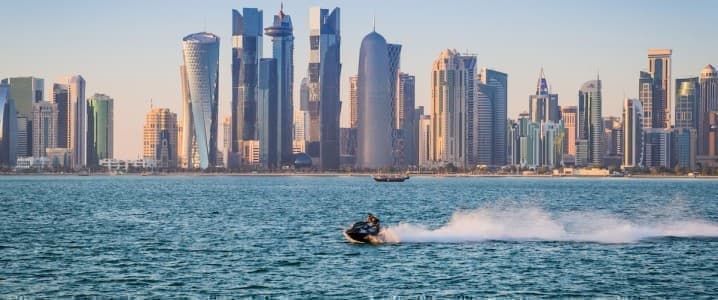Gulf economies are in for a stronger year than 2019 as investment programs aimed at diversifying them away from oil begin to bear their first fruit, a Reuters poll among economics has suggested.
According to the respondents in the poll, Saudi Arabia’s economy could expand by 2 percent this year, up from 0.3 percent last year. This is further going to rise to 2.2 percent in 2021, the polled economists said.
The majority believe that the weak growth last year was the consequence of Saudi Arabia’s going above and beyond to support prices, and cutting substantially more oil production than it was obliged to under the OPEC+ deal. However, the effect of these cuts should begin to wane as the non-oil industries in the Kingdom gather pace.
“Real GDP growth in Saudi should benefit from stronger non-oil activity as the investment program gains momentum. The drag from the oil sector should moderate in 2020 following a sharp reduction in oil output in 2019,” the chief economist of Abu Dhabi Commercia Bank, Monica Malik, told Reuters.
“Saudi Arabia’s third quarter GDP data, showing a fall of 0.5% year-on-year, was broadly as expected, with OPEC+ cuts constraining the contribution of the oil sector to economic growth,” Oxford Economics said in a note cited by Reuters, adding that the Kingdom’s efforts to shift away from oil were beginning to yield results. Related: This Shale Giant Is Ready For A Rebound
Saudi Arabia in December said it would cut spending this year by 7.8 percent but still expected to book a budget deficit at the end of the year. This deficit is expected to hit $50 billion, or 6.5 percent of GDP, up by $15 billion from 2019.
Saudi Arabia’s neighbour, the UAE, will also do well, according to the Reuters poll. Dubai has drafted a record budget for this year of $18 billion, with Abu Dhabi, the second-largest emirate and oil hub, spending $13.6 billion under a three-year package. Dubai is hosting the Expo 2020, which is certainly positive for its economic performance, and Abu Dhabi is investing in Masdar City: a smart city/tech innovation hub project expected to transfer the emirate’s economy away from oil.
The outlook for smaller producers such as Oman and Kuwait is more guarded, but still positive, with Oman’s GDP seen to expand 1.7 percent this year and 2.3 percent in 2021, and Kuwait’s economy expanding by 1.9 percent this year and 2.6 percent in 2021.
By Irina Slav for Oilprice.com
More Top Reads From Oilprice.com:
- Libya Is Facing A New Oil War
- Hydrogen Costs Could Be Set To Plunge By 50%
- Why Trump Can’t Retreat From The Middle East



















With proven oil reserves of 644 billion barrels (39% of the world’s reserves) and a combined GDP exceeding $2 trillion, the GCC countries could be a formidable economic bloc. However, their Achilles heel is their continued dependence on the oil export revenues to the tune of 85%-90%.
However, the greatest threat to their economies actually comes from the steeply-rising domestic oil consumption for power generation and water desalination and lack of diversification. To prevent this, the GCC countries not only have to accelerate the diversification of their economies but also become smarter in their investment. A precursor of this consumption is the subsidies, which though declining, still exceed $100 billion.
A proposed diversification entails adding value to their great oil wealth in the form of exporting more refined products rather than crude oil, developing their petrochemical industry and investing in food production.
Food production alone would save the GCC countries an estimated $50 billion annually in food imports mostly from the US. Another aspect of diversification is intensive investment in renewable energy, particularly solar power and water desalination technology.
Solar power could provide all the electricity needs of the GCC countries. It could also power an extensive network of water desalination plants along the Arab Gulf countries’ coasts extending from the Arabian Gulf to the Arabian Sea and the Red Sea, not only for drinking but also for irrigation. Moreover solar electricity could in the future be exported to Europe earning a very sizeable income for the Gulf countries.
The GCC countries are currently consuming 6.38 million barrels a day (mbd) or 33% of their oil production, a big chunk of which is being used to generate electricity and power 199 water desalination plants currently in operation.
This means that the Arab Gulf countries will have to cut their domestic oil consumption drastically or replace oil by nuclear power and solar energy in electricity generation and water desalination. Failing to do either would result in their relegation to minor crude oil exporters by 2030 or ceasing to remain oil exporters altogether by 2032.
Even with full diversification of the GCC economies, oil will continue to play the most decisive role in their economies but with far less adverse impact on their economies.
Diversification of the GCC economies would be judged a success when they could balance their budgets at $40 a barrel or less rather than the current $85-$90.
Dr Mamdouh G Salameh
International Oil Economist
Visiting Professor of Energy Economics at ESCP Europe Business School, London